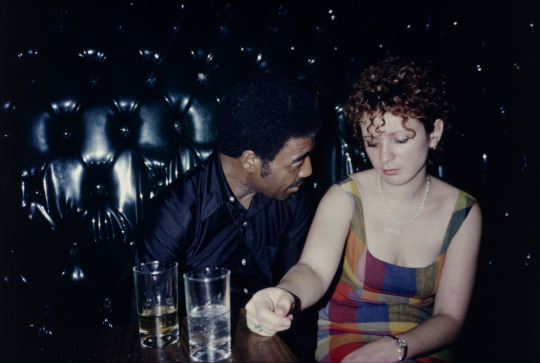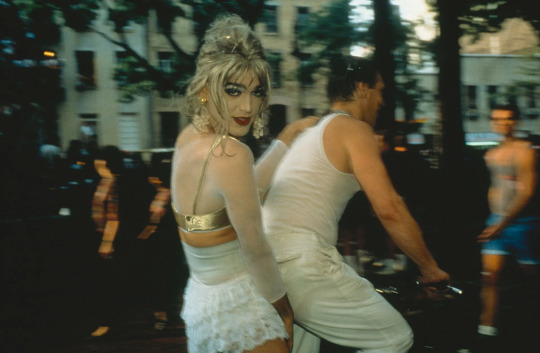Text
Things I know
loneliness
a girl stuck perpetually in time, giving herself up to be the temporal time guardian (a la Madoka). another girl who moves to the school notices her and realizes there’s something off about her. they get close, and the time guardian reveals her loneliness, her atonement.
a girl who is ready to give her heart out, a bit of an idiot (a la dancer in the dark) keeps getting rejected and ghosted by people who don’t care about her
how do we communicate? through words...
how do we stop communicating? through lack of social responsibility, through increased shame, through the need for self-protection
people holding their interests too close and afraid of being vulnerable, becoming increasingly cynical, “growing up,” scarcity mindset, narcissism, afraid of getting hurt, grass is greener syndrome
lack of communication; unable to bridge the gap - “i can’t reach you”
sometimes this communication is cut short by the fact that one of the people died and you can never have chances to make things up.
kayla and her brother
two business partners: one fallen angel (Senna) and another person who actually really cares for them, but the girl has attachment trauma so she will never know what it’s like when the guy opens his heart to her (blue valentine? angels - within temptation, Mitsuko, she will be loved)
grief and missing someone - we are nostalgic not because the past was good, but because the present is unbearable
actually happy moments, yeah?
lose yourself to dance: two friends, a gay guy and a girl (Senna) back in their youth
childhood, wonder, sensitivity
nature
being an artist
resilience and getting up again
the wise artist: “i’m at peace with the kind of person i am”
the epicurean artist: life is just about the small pleasures and a balance of them: enjoying good food, good art, good company. not much to it.
the warrior artist: “why don’t they like my stuff? UGH! I’ll show them! i’ll force them to like my stuff! no time to waste, gotta get to work!”
NOTE: I’m actually leaning more towards making them all the warrior artist archetype...
a creative writer, (nora)
a pansori singer, (tae-hee), main struggles are with her and her community
a pop idol, (??) insecurity, multiple personality disorder? -> i’m actually leaning towards making her not problematic at all, and instead, the embodiment of joy and love
use the same core character, but with different iterations?
fallen angel - “this world may have failed you that doesn’t give you a reason why, you could’ve chosen a better path in life”
0 notes
Text
Kayla and her brother
When someone dies suddenly and leaves you with so much unresolved grief and you replay the same moments over and over in your head, meeting them in that special sunset space where you both work out your issues with each other and try to gain some closure.
The feeling of unresolved grief. Wondering “what if”, your subconscious trying to re-enact the situation
Her brother was perfectionistic and an entrepreneur and arrogant, a bit of a rebel but naturally intelligent and wanted to flout authority, and would always make fun of her for being the “good” girl.
Authoritarian parents.
Kayla would always wonder why he had to be so provocative all the time, she didn’t understand, she didn’t find his jokes funny.
He actually went through a period where he was apathetic and became nihilistic and ended up recovering a bit, and then suddenly, the accident happened and he died.
The pain of growing apart in communication but neither party being mature enough to put into words, or brave enough to bring it to light...
“Only Goodness” Lumpar
It’s about layers.
Life is time writing a story.
0 notes
Text
Ghibli
The use of magical realism to provide both (a) points of fatalism that draw heavily on mythology, that seem just a bit "far-fetched" in order to build tension and/or comedy, and (b) as source of healing.
e.g. In Spirited Away: The giant baby
Zeniba turning Yubaba's baby into a small mouse
In Mononoke: The hand tendrils
the Deer God with sprouts coming out of its footsteps
0 notes
Text
The Ceramics Experiment
The ceramics teacher announced on opening day that he was dividing the class into two groups. All those on the left side of the studio, he said, would be graded solely on the quantity of work they produced, all those on the right solely on its quality. His procedure was simple: on the final day of class he would bring in his bathroom scales and weigh the work of the “quantity” group: fifty pounds of pots rated an “A”, forty pounds a “B”, and so on. Those being graded on “quality”, however, needed to produce only one pot — albeit a perfect one — to get an “A”. Well, came grading time and a curious fact emerged: the works of highest quality were all produced by the group being graded for quantity. It seems that while the “quantity” group was busily churning out piles of work-and learning from their mistakes — the “quality” group had sat theorizing about perfection, and in the end had little more to show for their efforts than grandiose theories and a pile of dead clay.
- Bayles & Orland, Art and Fear
0 notes
Text
Christopher Morley, “To a Child”
The greatest poem ever known
Is one all poets have outgrown:
The poetry, innate, untold,
Of being only four years old.
Still young enough to be a part
Of Nature's great impulsive heart,
Born comrade of bird, beast, and tree
And unselfconscious as the bee—
And yet with lovely reason skilled
Each day new paradise to build;
Elate explorer of each sense,
Without dismay, without pretense!
In your unstained transparent eyes
There is no conscience, no surprise:
Life's queer conundrums you accept,
Your strange divinity still kept.
Being, that now absorbs you, all
Harmonious, unit, integral,
Will shred into perplexing bits,—
Oh, contradictions of the wits!
And Life, that sets all things in rhyme,
may make you poet, too, in time—
But there were days, O tender elf,
When you were Poetry itself!
1 note
·
View note
Text
Success in life
Someone once said, "Success is different at different stages of development — from not wetting your pants in infancy, to being well liked in childhood and adolescence, to getting laid in young adulthood, to making money and having prestige in later adulthood, to getting laid in middle age, to being well-liked in old age, to not wetting your pants in senility."
(Healing the Shame that Binds You)
0 notes
Text
3 ways children behave
It has already been noted that children in dysfunctional families feel responsible for their family’s problems and also for solving them. There are basically three ways in which these children attempt to “save” their families: by being invisible, by being bad, or by being good.
To be invisible means to never ask for anything, never cause trouble, never make any kind of demand. The child who chooses this role scrupulously avoids adding any burden to her already stressed family. She stays in her room or blends into the wallpaper; she says very little and makes what she does say noncommittal. In school she is neither bad nor good—in fact, she is rarely remembered at all. Her contribution to the family is to not exist. As for her own pain, she is numb, she feels nothing.
To be bad is to be the rebel, the juvenile delinquent, the one who waves a red flag. This child sacrifices herself, agreeing to be the family’s scapegoat, the family’s problem. She makes herself the focus for the family’s pain, anger, fear, and frustration. Her parents’ relationship may be disintegrating, but she provides and frustration. Her parents’ relationship may be disintegrating, but she provides them with a safe topic they can work on together. They can ask, “What are we going to do about Joanie?” instead of, “What are we going to do about our marriage?” This is how she tries to “save” the family. And she has only one feeling, anger. It covers her pain and her fear.
To be good is to be what Janice was, an achiever out in the world, whose accomplishments are aimed at redeeming the family and filling the emptiness inside. Appearing happy, bright, and enthusiastic serves to cover the tension, fear, and anger inside. Looking good becomes much more important than feeling good—than feeling anything.
0 notes
Text
"Helping” may not be altruistically motivated
Children inevitably carry the guilt and blame for serious problems that affect their families. This is because through their fantasy of omnipotence they believe both that they are the cause of the families’ circumstances and that they have the power to change them, for better or worse. Like Lisa, many unfortunate children are actively blamed by parents or others in the family for problems over which the children have no control. But even without the verbal blame of others, a child will assume a large portion of the responsibility for his or her family’s troubles.
It is not easy or comfortable for us to consider that selfless behavior, “being good,” and efforts to help may actually be attempts to control, and not be altruistically motivated. I saw this dynamic simply and succinctly represented by the sign on an office door in an agency where I once worked. Shown was a twotone circle, the top half of which was a bright yellow rising sun and the bottom half of which was painted black. The sign read Help Is the Sunny Side of Control. It served to remind us counselors as well as our clients to constantly examine the motives behind our need to change others
0 notes
Text
Women who love too much, anecdotes
Chloe and Roy
We were in an art class together for a whole semester and never spoke to each other. When the second semester began, several of us were together again in another class, and on the first day we all got into this heavy discussion about relationships between men and women. Well, this guy started talking about American women being totally spoiled, wanting to have everything their own way, and how they just used men. He was dripping with venom as he was saying all this, and I thought, Oh, he’s really been hurt. Poor thing. I asked him, “Do you really think that’s true?” and I started trying to prove to him somehow that women weren’t all like that—that I wasn’t like that. Look at how I set myself up! Later on in our relationship, I would not be able to make any demands or take care of myself in any way, or I’d be proving him right in his misogyny. And all my concern that morning in class worked. He was hooked, too. He said, “I’ll be back. I wasn’t going to stick with this class, but I want to talk to you some more!” I remember that right then there was this terrific rush, because already I felt I was making a difference to him.
Mary Jane and Peter
Mary Jane: married for thirty years to a workaholic We met at a Christmas party. I was there with his younger brother who was my age and really liked me. Anyway, there was Peter. He was smoking a pipe and wearing a tweed jacket with patches on the elbows, and he looked so Ivy League. I was terribly impressed. But there was also an air of melancholy about him and really that was as attractive to me as his looks. I was sure he’d been deeply hurt at some time and I wanted to get to know him, to know what had happened, and to “understand.” I was sure he was unattainable, but I thought if I could be especially compassionate, perhaps I could keep him talking to me. It was funny, because we did talk rather a lot that first evening, but he never quite squared off with me, face to face. He was always at an angle, slightly preoccupied with something else, and I kept trying to win his complete attention. What happened was that every word he spoke to me became vitally important, almost precious, because I was sure he had better things to do.
It had been just like that with my father. When I was growing up he was never there—literally. We were quite poor. He and my mother both worked in town and left us kids at home alone much of the time. Even on weekends he did odd jobs. The only time I saw Dad was when he was home fixing something—the refrigerator or the radio or something. I remember it always felt like he had his back to me, but I didn’t mind because it was just so wonderful to have him around. I used to hang around and ask him lots of questions to try and get him to pay attention to me.
Well, here I was, doing the same thing with Peter, though of course I didn’t see it that way then. I remember now how I kept trying to be in his direct line of vision and how he kept sort of puffing away at this pipe, looking off to the side or up at the ceiling, or fiddling with keeping the pipe lit. I thought he was so very mature, with his furrowed brow and faraway look. I was drawn like a magnet.
Mary Jane’s attraction to her father
Mary Jane’s feelings about her father were not nearly as ambivalent as those of many women who love too much. She loved her father, admired him, and yearned for his company and attention. Peter, being older and preoccupied, instantly replicated for Mary Jane her elusive father, and winning his attention became all the more important because, like with her father, his was so difficult to capture. Men who willingly listened to her, who were more emotionally present and more affectionate, failed to arouse in Mary Jane the deep yearning to be loved she had felt with her father. Peter’s in Mary Jane the deep yearning to be loved she had felt with her father. Peter’s preoccupation offered a familiar challenge to Mary Jane, another chance to win the love of a man who avoided her.
Peggy
I saw this fellow over next to the wall. He was very tall, very slim, dressed incredibly well, and very good looking. But he also had an air of coldness about him. I remember telling myself, That is the most elegant, arrogant man I’ve ever seen. And then, I’ll bet I could warm him up!
Incidentally, I can still remember the moment when I met my first husband. We were in high school and he was lounging against the wall when he should have been in class, and I said to myself then, He looks pretty wild. I’ll bet I could settle him down. See, I was always trying to fix things. Anyway, I went up to Baird and asked him to dance.
0 notes
Text
Dogville
The Big Man: You do not pass judgement, because you sympathize with them. A deprived childhood and a homicide really isn't necessarily a homicide, right? The only thing you can blame is circumstances. Rapists and murderers may be the victims, according to you. But I, I call them dogs, and if they're lapping up their own vomit the only way to stop them is with the lash... Dogs can be taught many useful things, but not if we forgive them every time they obey their own nature.
Grace: So I'm arrogant. I'm arrogant because I forgive people?
BM: My God. Can't you see how condescending you are when you say that? You have this preconceived notion that nobody, listen, that nobody can't possibly attain the same high ethical standards as you, so you exonerate them. I can not think of anything more arrogant than that. You... you forgive others with excuses that you would never in the world permit for yourself... you must maintain your own standard. You owe them that. You owe them that. The penalty you deserve for your transgressions, they deserve for their transgressions.
Grace: They are human beings --
BM: No, no, no. Does every human being need to be accountable for their action? Of course they do. But you don't even give them that chance.
0 notes
Text
Celine from Before Sunset
I mean, I always feel like a freak, because I'm never able to move on like... this! You know. People just have an affair, or even entire relationships... they break up and they forget! They move on like they would have changed brand of cereals! I feel I was never able to forget anyone I've been with. Because each person have... their own, specific qualities. You can never replace anyone. What is lost is lost. Each relationship, when it ends, really damages me. I never fully recover. That's why I'm very careful with getting involved, because... It hurts too much! Even getting laid! I actually don't do that... I will miss on the other person the most mundane things. Like I'm obsessed with little things. Maybe I'm crazy, but... when I was a little girl, my mom told me that I was always late to school. One day she followed me to see why. I was looking at chestnuts falling from the trees, rolling on the sidewalk, or... ants crossing the road, the way a leaf casts a shadow on a tree trunk... Little things. I think it's the same with people. I see in them little details, so specific to each of them, that move me, and that I miss, and... will always miss. You can never replace anyone, because everyone is made of such beautiful specific details. Like I remember the way, your beard has a bit of red in it. And how the sun was making it glow, that... that morning, right before you left. I remember that, and... I missed it! I'm really crazy, right?
0 notes
Text
Ling Ma, Severance
The abundance of fakes in Hong Kong, the center of shopping and eating:
“What surprised me in Hong Kong, however, was how many iterations of the same thing were available. Take a Louis Vuitton bag, for example. You could buy the actual bag, a prototype of the actual bag from the factory that produced it, or an imitation. And if an imitation, what kind of imitation? An expensive, detailed, hand-worked imitation, a cheap imitation made out of polyurethane, or something in between? Nowhere else was there such an elaborate gradient between the real and the fake. Nowhere else did the boundaries of real and fake seem so porous” (100).
Burning spirit money for ancestors, along with other things:
“Some spirit bills were intricately printed to look like US dollars, Chinese yuan, Thai baht, and Vietnamese dong. The spirit world accepted a variety of international currencies. And not only spirit money, but other afterlife luxuries. There were diamond necklaces and cell phones and Mercedes convertibles, all made of cardboard to be easily burned. There were paper Gucci wallets and Fendi handbags, so that the ancestors could organize and store all that spirit money. There were even paper facsimiles of iPods and MacBook Pros. On top shelves were dollhouse-sized cardboard constructions of homes, printed with elaborate, intricate details and furnished with paper furniture” (104).
A New Yorker review of Severance:
Candace’s language turns uncharacteristically expansive when she describes her memories of China. Her past there is a palimpsest, with bright recollections of summers back in the motherland as an Americanized teen-ager layered on top of fainter traces from her early childhood in Fuzhou. At one point, she rhapsodizes about the local evenings. “If Fuzhou Nighttime Feeling were a sound,” she says, “it would be early/mid-nineties R&B. If it were a flavor, it would be the ice-cold Pepsi we drink as we turn down tiny alleyways where little kids defecate wildly. It is the feeling of drowning in a big hot open gutter, of crawling inside an undressed, unstaunched wound that has never been cauterized.” Ma is at her most deft when depicting this kind of severance: the amputation of the immigrant’s past, preserved like a phantom limb whose pain is haunted with absence. [src]
0 notes
Text
The photos of Nan Goldin
Nan Goldin (born 1953), American photographer. From Wikipedia:
Her work often explores LGBT bodies, moments of intimacy, the HIV crisis, and the opioid epidemic.
Exposed to sexuality, tense family relationships, and the suicide of her older sister Barbara at a very young age, Goldin began to use a camera when she was sixteen years old to cherish relationships with those who she photographed.
Her early influences include Andy Warhol’s early films, Federico Fellini, Jack Smith, French and Italian Vogue, Guy Bourdin and Helmut Newton.





0 notes
Text
American Beauty - Review
Is a satirical tragicomedy, framed by a narrator, who we find out later is narrating during the last few lucid moments of his life, where his life “flashes before his eyes” after getting shot in his own kitchen.
At the beginning, we are shown Lester Burnham in a dead marriage to real estate broker Carolyn, who is Type A personality type and image-obsessed. Both his wife and daughter Jane think he is a huge loser.
Carolyn repeats to herself “I will sell this house today. I will sell this house today.”
We can see how restrictive and of a control freak Carolyn is at dinnertime when Jane requests to play other music and Carolyn shoots her down by saying she can listen to other music when she cooks food for the family.
Their neighbors are Jim and Jim, two lovers; Ricky Fitts and his abusive veteran father.
One day, Jane brings over her friend Angela, a wannabe model, and Lester starts to lust over her. As incentive, he starts working out, quits the job he hates and takes one up at a fast food place, blackmails his employer into giving him a generous severance package.
Ricky Fitts is into filming everything.
The most beautiful thing that Fitts has ever filmed is a plastic bag blowing in the wind.
0 notes
Text
Djamila Knopf, “Story-Driven Illustrations”
1: Ideation and Emotional Impact
Why tell stories?
We remember things better when they’re delivered in story format.
Connection between artist and the viewer.
What makes a story?
Emotion is very important.
"A snapshot of the world behind the frame"
When characters seem concerned with their own reality within the image
What breaks a story:
When a scene feels posed or unnatural (catalog images, shutterstock)
*** You can use this to your advantage!
Cultivating taste
Get better at identifying what inspires you.
What made you want to create art in the first place?
When does something leave an impression on you?
"Show me the things you love" “Show me your memories”
“Show me where you spent your time when you were younger”
Influence map (Fox-orian)
Emotion is very important.
Ideas are not about being cool. They're about being honest.
Keep the story simple: Narrow it down to one sentence.
0 notes